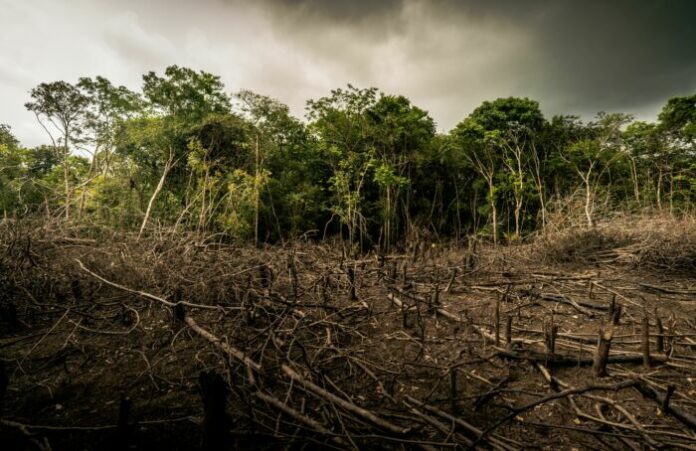
The global food system is inherently illogical. It uses 40 percent of the Earth’s ice-free land surface, is the leading cause of biodiversity loss, is responsible for 70 percent of freshwater consumption and more than a quarter of greenhouse gas emissions. Nevertheless, nearly a third of the world’s population does not have enough food. On the occasion of World Food Day on Oct. 16, WWF, as part of its Our Future campaign, returns to call on institutions to take better care of the food system and with it the natural resources and ecosystems it exploits, bringing attention back to the biodiversity loss findings analyzed in the Living Planet Report 2024 released globally last week.
Too often the food we consume, including in Italy, from chicken to fish to products containing palm oil, coffee and chocolate, has direct links to the destruction of some of our most precious ecosystems. The Amazon and other rainforests around the world, home to some of the most iconic species, are being bulldozed to reclaim land that is then used to raise livestock or for crops and plantations. WWF reports that nearly 90 percent of deforestation, especially in biodiversity-rich tropical and subtropical areas, is caused by our consumption. It is imperative to put an end to this.
The European Union is the second largest “importer” of tropical deforestation in the world after China. Among EU countries, Italy is the second largest consumer of raw materials at risk of nature destruction, being responsible for the deforestation of nearly 36,000 hectares per year. Soybeans, palm oil and beef were the raw materials imported into Italy with associated the greatest tropical deforestation. Each Italian with their food consumption is responsible for the deforestation of 6 square meters per year.
To reduce the impact of Italian and European citizens’ consumption on forests, the EU passed in 2023, the EUDR, the European “anti-deforestation” Regulation, which stipulates that from December 30 this year, 7 commodities (soybeans, palm oil, beef, coffee, wood products, cocoa, rubber) and all their derivatives can only be introduced to the European market if importing companies can prove that the products have not caused deforestation, for example by tracking the place of production and all stages of the supply chain.
Last October 2, however, the European Commission proposed to postpone the entry into force of the EUDR by 12 months, thus to December 30, 2025. These very days, EU member states are expected to decide whether to accept this proposal. This decision by the European Commission follows requests from several member states, including Italy, and pressure from the business community who believe there are unresolved critical issues that do not allow them to operate in accordance with the required technical documentation right away.
“If the EU Parliament and Council approve the proposal, businesses will have one more year to prepare but there will also be one more year to destroy the Planet’s forests to make way for crops, plantations and livestock farms,” says Eva Alessi, WWF Italy’s Sustainability Manager. ”Postponing this by one more year means that we could lose (if the trend remains the same as in recent years) another 3 million hectares, or 8 soccer fields of virgin rainforest every minute.
WWF stresses that implementing the EUDR is not just a matter of legislation-it is an ethical commitment to protect our Planet. The postponement sends the wrong message to citizens, both inside and outside the EU, suggesting how the creation of a deforestation-free commodities market can wait. The world’s forests cannot afford another year to be protected.
Soy has become a key ingredient in the diet of farmed animals, fueling an intensive industry that consumes huge amounts of the legume to produce meat, dairy products and eggs. Most soy is linked to the deforestation and conversion of savannas and grasslands in South America, such as the Cerrado, the savanna ecosystem with the greatest biodiversity in the world that is home to iconic species such as the jaguar, the largest feline on the American continent and the third largest carnivore on the planet of which only 170,000 remain in the wild and to date survive in 50 percent of what was its natural territory.
Few people know, as they eat chicken breast or a pork chop or farmed salmon, that that food has arrived on our plates thanks to the felling of forests and the loss of unique species. Nowhere in the world today is the loss and degradation of forests and other priority ecosystems caused by industrialized agriculture more evident than in South America. Even, the coffee and chocolate at the end of a meal may have been produced at the expense of the Planet’s forests.
We need the EU to end the deforestation caused by our food, but there is much we consumers can do right now, too, to ease the pressure on forests and do our best to eat more sustainably. In a world that annually raises 80 billion land animals – 10 times the human population – for human consumption, most of them on intensive farms, a change in the food system requires a radical shift, including a reduction in farmed animals and diets more based on plant foods.
In the meantime for the EU to make rules to ensure that what we consume does not in turn eat forests, we can prefer a diet of plant foods, little meat and few animal by-products, making sure they come from farms that respect animal welfare and nature, such as organic farms and extensive/free-range farms.
“If at the global level we succeed in moving in this direction,” Alessi concludes, ”the results will be a more sustainable food system and viable forests capable of contributing to the fight against climate change, conservation of biodiversity, and ensuring food security.



































